Education
a step forward, but social licence remains fragile
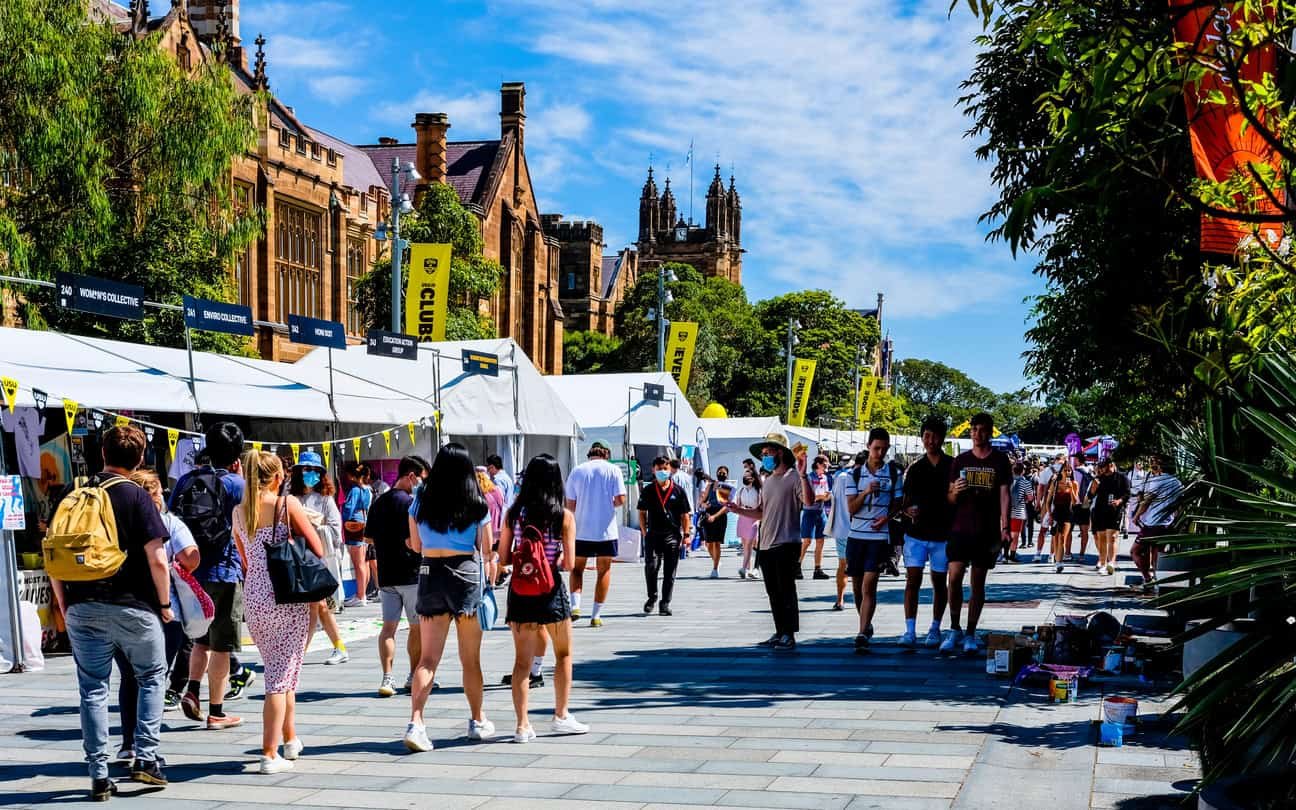
Australia’s international education sector has long been a cornerstone of the nation’s economy, culture, and global reputation. The announcement of a new National Planning Level (NPL) of 295,000 international student places signals both recovery and ambition. This represents an increase of 25,000 over the 2024–25 limit of 270,000, although it remains 8% below the immediate post-covid peak.
At first glance, this uplift is a positive recognition of the value international students bring not only to universities but also to local communities and the broader economy.
However, Australia’s social licence to host international students is under strain. The growing number of conversations and community dialogue surrounding the planning of nationwide protests on August 31 shows how anti-immigration rhetoric can spill onto the streets and into the daily lives of students.
An international student cannot be distinguished from a migrant, and nor should they be. All who come to Australia deserve to feel safe and welcome if the country wishes to bring in more international students.
Social licence in international education rests on trust. Families must trust that Australia offers not only high-quality education but also a secure and inclusive environment. If that trust falters, recruitment targets risk becoming unattainable regardless of favourable policy settings.
Students themselves are voicing this fear on social media. One remarked: “When locals start openly supporting anti-immigration protests, I worry if it is only a matter of time before that anger spills over onto students like me.”
Another student shared: “Some people keep saying these protests will not be that big, just a few hundred angry people and nothing to worry about. But do not be naive. The attention around this is growing every single day. I am seeing more locals supporting it online and joining in, and that is what makes it dangerous. It is not about the numbers anymore, it is about the mindset that is spreading.”
These concerns highlight that the protests are not only symbolic but also deeply personal for those who already feel vulnerable in a new country.
When I spoke with Marcela Lapertosa, director of education at Value Learning Intercultural Specialists, she emphasised that protecting Australia’s social licence requires a fundamental shift.
“We should move from a narrative of volume to one of value. Universities, schools and governments need to actively communicate the genuine benefits international students bring to local communities – not just in economic terms, but cultural richness, innovation, and global connections that strengthen Australian society.
“This means telling authentic stories of positive impact and building lasting community partnerships. It also requires moving beyond multiculturalism to genuine interculturalism, where different cultural groups actively engage with and learn from each other, rather than simply coexisting,” added Lapertosa.
This focus on interculturalism highlights that integration is not a one-way street. It is not only about how students adapt to Australia, but also how Australians adapt to and embrace them.
On the question of how institutions can better support integration beyond the classroom, Lapertosa was clear: “True integration starts well before students arrive and extends far beyond the classroom. We should begin building relationships early – even at the school level – creating pathways that foster long-term connections with Australian communities.
“Homestay programs need to evolve beyond their transactional nature into meaningful cultural exchange opportunities that benefit both families and students. Universities must invest in programs that connect students with local community groups, volunteer opportunities, and mentorship networks that help them contribute to and feel genuinely part of Australian society.”
She stressed that integration also requires recognising that host families and local students are learners too. “It is at this intimate, household or classroom level where perceptions genuinely start to change. When Australian families experience firsthand the humanity, aspirations, and contributions of international students, they become powerful advocates for the value of international education in their own communities.”
This perspective underscores that the increase to 295,000 student places is cause for optimism, but it will mean little if the lived experience of students does not match the promise. International education is built on more than visa numbers; it is built on the everyday reality of safety, belonging, and welcome. If Australia wants to remain a leading destination, it must not only open its doors but also open its arms.
This is the moment for universities, governments, and communities to reaffirm that international students are valued as people rather than purely economic contributors. Stronger investment in student housing, visible safety measures, and genuine community integration will be key to restoring confidence.
Education
What I wish I knew before going to university

 BBC
BBCOver the next couple of weeks, hundreds of thousands of new students will descend on universities around the country.
For many, this will mark the start of a brand new adventure – though one often filled with a lot of worry.
To help with nerves, BBC News asked for tips from 2024’s first-years, who’ve already sussed out being freshers.
From balancing studies and social life, to looking after your mental health and the importance of doing the washing up, this is what the class of 2024 have to say to the new kids on the block.
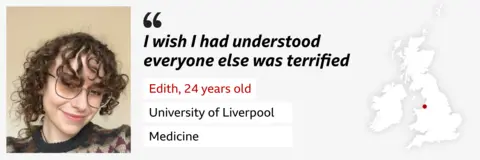
Edith Adam says she was “terrified” when she moved to Liverpool last year to study medicine.
What she hadn’t realised at the time was that other freshers were just as scared as she was.
“I was absolutely terrified about not being able to make friends or that people wouldn’t like me,” says Edith, who’s now going into her second year.
“I wish I had understood everyone else was terrified, and that they appreciate it when you go up to them and say hi.”
 Edith Adam
Edith AdamHaving never been to Liverpool before – a city with a party reputation – Edith worried she might not fit in.
“I was really scared of being ostracised for not wanting to go clubbing every night and not being a drinker,” she says.
But Edith was still able to find her people.
“No one actually cares. There are plenty of things you can do that don’t revolve around late nights. Just find what works for you.”
 Edith Adam
Edith AdamThe 24-year-old, from Huddersfield, says her advice would be not to put too much importance on the infamous freshers’ week.
“I think everyone goes in with the expectation that it’s this amazing, wild week, where you meet your best friends for life and have your best time at uni,” she says.
And her top tip for staying friends with your flatmates?
“If it takes less than two minutes, just do it,” Edith says. “It’s so easy for everything to pile up, and then you don’t wash your plates for five days, and all of a sudden everything is dirty and you have no cutlery – and your flatmates hate you.”
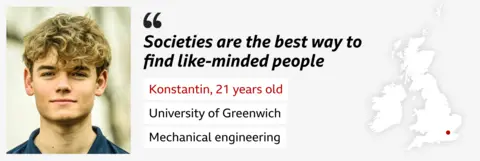
But what if you can’t make freshers week?
This is the situation Konstantin Schmidt faced last year, after issues with his visa delayed his start at Greenwich University by five weeks.
Although people told him the freshers parties he’d missed out on were “fun”, the mechanical engineering student says he still managed to settle in well by joining up to student clubs.
“Societies are the best way to find people who share the same passion,” Konstantin says.
 Konstantin Schmidt
Konstantin SchmidtJoining both a volleyball society and the Formula One society, he says he had positive interactions right from the off.
“The second I joined the room the members saw I was new and instantly included me,” Konstantin says. “I also met new people through volleyball who were on my course who quickly became my friends.”
 Konstantin Schmidt
Konstantin SchmidtThe 21-year-old bonded with his flatmates by exploring each other’s culture through food and music.
In his first weeks, Konstantin, who’s from Bavaria in Germany, made Spätzle – a pasta dish topped with grilled cheese for a dinner party with his flatmates.
“Everyone really liked” his food, he says – but he admits the best dish was a Filipino one made by his flatmate, Kai.
“It helped us understand everyone’s culture even better,” Konstantin says.
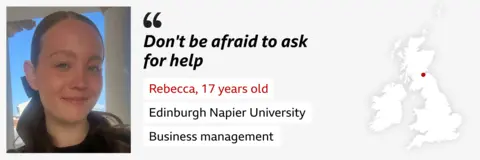
While many people starting university will be living away for the first time, some students still live at home.
Commuting more than an hour each way between Glasgow and Edinburgh, Rebecca can relate.
“If they forget something, my friends can just nip back to their accommodation, whereas I can’t, ” she says. “But it’s not bad, I like commuting in.”
Going into her second year of a business management course, Rebecca is now much more organised and comfortable with the journey, after experiencing some hiccups in her first year.
 Handout
HandoutIn some cases, cancelled trains meant she had to pay for a taxi all the way to Edinburgh.
“In second year I will definitely be checking my trains,” Rebecca says.
Her advice for freshers is simple: “Make sure your bag is fully packed with everything you might need – and plan your commute.”
Rebecca’s university experience has been different from many others as she was only 16 when she started her course.
“I thought everyone was going to be older and not want to speak to me,” she says. “But it wasn’t like that at all. The age gap doesn’t really matter.”
 Handout
HandoutNow 17, Rebecca is still waiting to experience a full freshers’ week, but says she was still able to attend under-18 events.
Her advice for those in a similar position?
“Don’t be afraid to ask for help,” she says. “I felt like I couldn’t ask for help because people would think I didn’t deserve to be there because I’m younger.
“They don’t care that you’re 16 or 17. Just ask for help.”
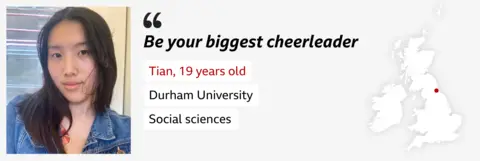
As the first in her family to go to university, Tian Liu didn’t know what to expect before she started her combined honours degree in social sciences.
“I did so much research, but I still felt so unprepared,” Tian says. “University is definitely a roller coaster. There was a point I wanted to drop out, but now I can definitely see the fruits of my labour.”
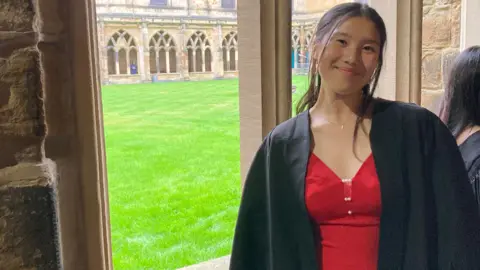 Tian Liu
Tian LiuNow going into her second year, the 19-year-old has found a better balance and would advise incoming students to look after their mental health.
“With tuition fees rising there is such a pressure to make the most out of it, but you can burn out,” Tian says. “University is as much as you make of it, but give yourself grace.
“Have close friends who can act as support and accountability if you are doing too much, and use pastoral teams that the university offers,” she adds.
“There is no need to rush, it’s all a constant learning curve.”
 Tian Liu
Tian LiuOne year on from moving to Durham from Leeds, Tian is in New York completing an internship she got through her university – something she “could never have imagined” last year.
Her advice for incoming students?
“Don’t disqualify yourself from anything. Be your biggest cheerleader. And take so many photos.”
Education
Franklin County Schools considering AI gun detection software
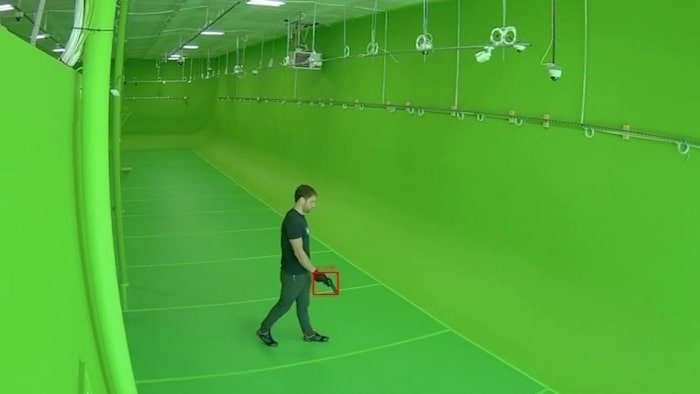
FRANKLIN COUNTY, Va. – School board members are discussing the use of artificial intelligence to detect guns on school grounds.
Superintendent Dr. Kevin Siers said the board has been exploring options, including software from Zero Eyes that uses existing security cameras and AI to identify firearms and alert an incident center within seconds.
“We take safety and security very serious,” Siers said. “So that caused us to take a deeper look into what options are available for weapons detection.”
Dustin Brooks, a co-founder of Zero Eyes, said the system is designed to be proactive and to prompt an immediate response. He described a process in which a camera detects a gun, an operations center verifies the alert, and then dispatches notifications to the school and local authorities.
“From detection — gun brandished in front of camera, camera picks up gun, operation center verifies alert, dispatch alert, customer receives alert — that process can be, you know, as fast as three to five seconds,” Brooks said.
Brooks said human analysts review any images the AI flags, which he said reduces false alarms. He added that the system is narrowly focused on detecting firearms and does not share other images with the information center.
“We’re looking for guns. The only thing that we’re looking for is guns,” he said.
Siers emphasized the move is to prepare for dangerous incidents before they even happen.
“Our resource officers do a great job of trying to study those incidents when they occur and then trying to apply how the lessons learned there might be applied in our schools,” he said. “So it’s just an ongoing process and, unfortunately, it’s something that too many schools are having to deal with.”
If approved, the technology would be implemented at Franklin County Middle School and Franklin County High School.
Roanoke City and Salem Public Schools are among other districts that have used or are considering similar AI detection software.
Copyright 2025 by WSLS 10 – All rights reserved.
Education
AI and the Future of Learning at the Acropolis
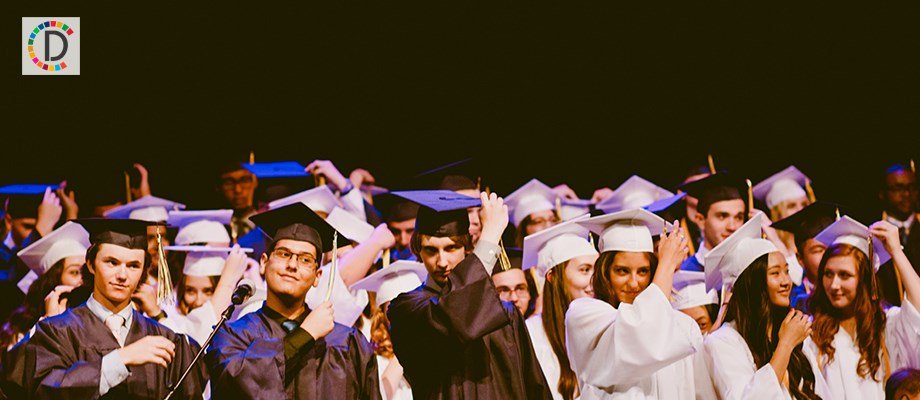
At the foot of the Acropolis in Athens, Demis Hassabis, the CEO of Google’s DeepMind and 2024 Nobel laureate, underscored the imperative skill of learning how to learn in an era dominated by Artificial Intelligence. Addressing attendees at an ancient Roman theatre, Hassabis illuminated the pressing need for adaptability amidst rapid technological evolution.
Hassabis highlighted the future potential of artificial general intelligence, predicting its arrival within a decade. He emphasized the requirement for ‘meta-skills’, such as mastering new disciplines, to complement traditional education in fields like math and science. His remarks reflect the necessity of continual learning to navigate the swiftly changing landscape catalyzed by AI innovations.
Joining the discussion, Greek Prime Minister Kyriakos Mitsotakis warned about the financial inequalities proliferated by burgeoning tech behemoths. He pointed out the potential social unrest stemming from disproportionate wealth generated within a few companies, urging that AI advancements benefit all layers of society.
-

 Business2 weeks ago
Business2 weeks agoThe Guardian view on Trump and the Fed: independence is no substitute for accountability | Editorial
-
Tools & Platforms1 month ago
Building Trust in Military AI Starts with Opening the Black Box – War on the Rocks
-

 Ethics & Policy2 months ago
Ethics & Policy2 months agoSDAIA Supports Saudi Arabia’s Leadership in Shaping Global AI Ethics, Policy, and Research – وكالة الأنباء السعودية
-

 Events & Conferences4 months ago
Events & Conferences4 months agoJourney to 1000 models: Scaling Instagram’s recommendation system
-

 Jobs & Careers2 months ago
Jobs & Careers2 months agoMumbai-based Perplexity Alternative Has 60k+ Users Without Funding
-

 Podcasts & Talks2 months ago
Podcasts & Talks2 months agoHappy 4th of July! 🎆 Made with Veo 3 in Gemini
-

 Education2 months ago
Education2 months agoMacron says UK and France have duty to tackle illegal migration ‘with humanity, solidarity and firmness’ – UK politics live | Politics
-

 Education2 months ago
Education2 months agoVEX Robotics launches AI-powered classroom robotics system
-

 Funding & Business2 months ago
Funding & Business2 months agoKayak and Expedia race to build AI travel agents that turn social posts into itineraries
-

 Podcasts & Talks2 months ago
Podcasts & Talks2 months agoOpenAI 🤝 @teamganassi


